
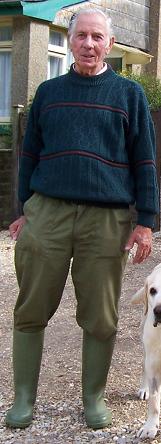
Ted Price
“Seven Times a Hero”
Photograph ©Trevor Ryder 2007
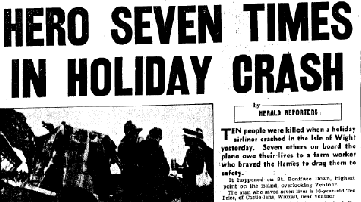
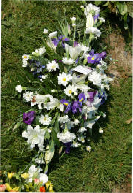
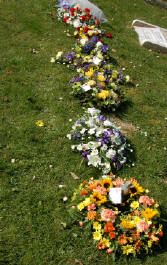
Edwin Llewellyn Price died at his home
in Wroxall in March 2007 aged 80 years.
Ted, as he was known to everyone, was a traditional countryman and farm worker with a fascination for natural history and a love of traditional country ways. A lifelong hunt follower, he loved the Downs above Ventnor where he spent much of his spare time. He was never too busy to help his friends and neighbours and had a wealth of knowledge and stories about the Isle of Wight. There was little he didn’t know about the area’s history and wildlife and although shy and retiring, once he got to know you, it became a lifelong friendship.
Ted spent much of his time on St Boniface Down where he walked his dogs, and some say took the occasional rabbit for the pot. On the afternoon of Sunday May 6th 1962 he was cutting bean sticks on the southern slope of the hillside below the Radar Station. Despite the dense fog which had covered the high ground for the last two days, Ted was quite at home and knew the area well, but suddenly his life, and that of 17 others changed for ever as a huge airliner burst out of the mist and hit the ground just yards from where he was standing.
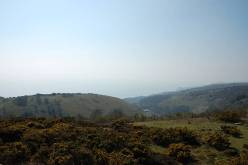
Realising immediately that this was a major incident and that he was the only one able to help, Ted managed to climb the eight foot security fence surrounding the radio masts and radar station and run to the wrecked aircraft which was now on fire.
He well knew the risks he faced and that he too could become a victim, yet over the next few minutes he made no less than seven trips into the plane’s burning interior to drag out injured and stunned survivors. Even when the fuel tanks had begun to explode and he was almost struck by fragments from an exploding tyre, he kept going, with complete disregard to the increasing danger from burning petrol. When it was clear that he could do no more, he rendered first aid to the survivors and then climbed back over the wire to get help. Having raised the alarm by contacting a group of radio amateurs who were engaged in a communications exercise on the Down, Ted again returned to the aircraft and continued his first aid, shielding the victims from the heat and doing what he could to make them comfortable. When the emergency services arrived Ted made sure that the survivors were in good hands and quietly went home.
Ted was cutting bean sticks just beyond the fence when the crash occurred.
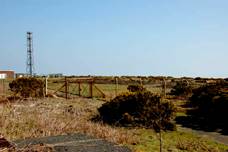
Ted climbed this fence three times during his rescue of seven people from the Dakota. The aircraft came to rest in the grassed area beyond the gates. Visibility was just a few yards.
It is said that he arrived reeking of smoke and aviation fuel but slipped quietly into the house and went to wash, saying nothing about what had happened.
Later that night when those who did not survive were lying in a temporary mortuary in the village, a single daffodil was placed on each coffin by an unknown hand. It was only later when the story of an unknown rescuer came out that Ted was eventually tracked down.
Ted Price reluctantly received official commendation recognition for his act on the Down, but always shunned publicity and did not seek recognition or praise for his incredible bravery. He would talk about the accident and his role in the rescue of seven people, five of whom survived, but would never volunteer information and never accepted that he had performed a heroic act, claiming that anyone would have done the same in those circumstances.
His own death was a dreadful irony after his selfless actions all those years ago, but his funeral in Wroxall cemetery took place on a beautiful spring day with 120 mourners clustered around his grave to send this unassuming countryman on his last journey. He now overlooks his beloved St Boniface Down where on that foggy day in May 1962, he repeatedly risked his life so that five strangers could keep theirs.
If Ted ever wanted an epitaph it must be the opening words of the Memorial Service spoken by one of the survivors, himself a very brave and charming man :
“ I won’t say I’m glad to be here and in many ways I would rather not be, but I and my fellow passengers were able to come for two reasons – the Grace of God – and Ted Price.”
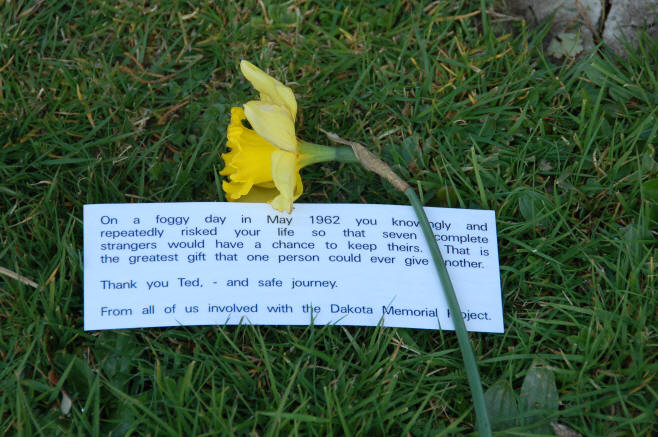
| Instruments |
| Visibility |
| Navigation |
| An Alternative Theory |
| Pressure On Crews |
| Blame |